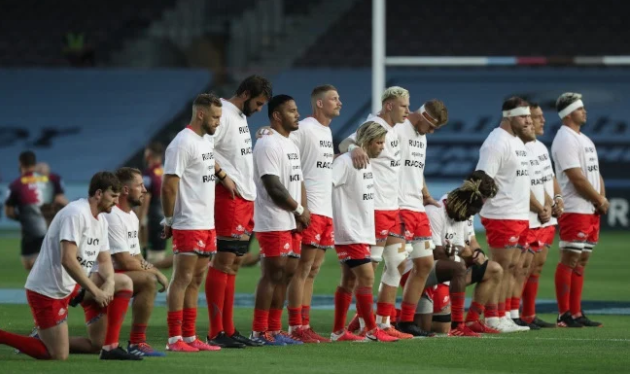Former Springbok Stefan Terblanche has highlighted the importance of respecting each other – and individual choices and views – after certain players opted not to take a knee prior to the resumption of the English Premiership.
On Sunday, Wasps players took a knee, while the Northampton Saints stood in a circle with shirts highlighting ‘Rugby Against Racism’, prior to kick-off of the final English Premiership match at the weekend.
It added to a variety of responses from teams as they were given freedom to demonstrate different interpretations of the ‘Rugby Against Racism’ campaign.
READ: Different responses to ‘Rugby against Racism’ campaign
Last week, the Sale Sharks – in one example – announced the squad would ‘stand together in the face of all discrimination’ before kick-off.
All the players wore ‘Rugby Against Racism’ T-shirts, but only four of the starting XV – Englishmen Marland Yarde, Tom Curry, Simon Hammersley and Sam Hill – chose to kneel prior to kick-off against Harlequins on Friday. This action has become a powerful symbol related to the Black Lives Matter movement.
However, 11 players in the starting lineup chose to remain standing, including eight South African players.
While it did lead to backlash in some quarters, Terblanche provided perspective on the photo.
Elsewhere, South Africans Ruan Ackermann and Francois Venter also opted to stay standing.
Last Tuesday, representatives from all 12 clubs met via conference call on Tuesday to discuss how best to show support, but sides were expected to come up with differing gestures, with no directive handed down from Premiership Rugby or the Rugby Football Union.
For one, England and Bath wing Anthony Watson said making Premiership players take a knee against their wishes would defeat the objective of the movement.
‘It’s massively important for rugby to get behind the movement, and not just rugby but across the board, sport in general. It’s important to make an impact where you can,’ he said.
‘You have to give people a choice, because as soon as it is forced on anyone to have to do anything it becomes pointless. The whole point is for it to mean something. I don’t think anyone should have the option taken away from them. It’s important that it is very individualised.’
Meanwhile, South Africa-born Sale captain Jono Ross was forthright on the issue.
‘I don’t think anyone in our squad or across the Premiership is racist. We’ll show on Friday night that we are against racism in all forms and as a squad we’ll be united in showing that. As a squad we’re all completely against racism in all forms and I think we’ll make that clear.’
Photo: Getty Images





